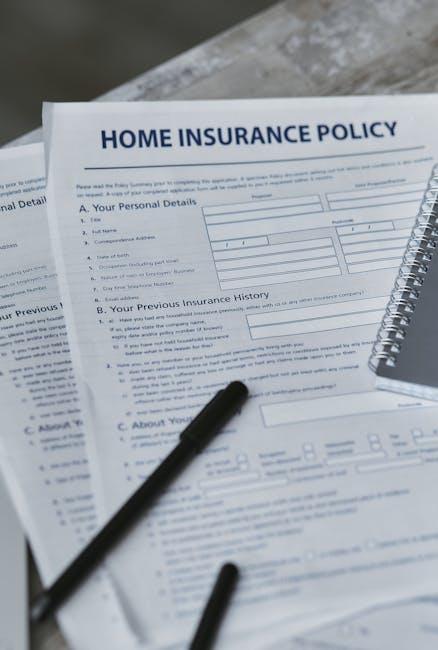Navigating the complex world of insurance claims can often feel like an overwhelming task, filled with intricate details and potential pitfalls. For many, the ultimate goal is to have their insurance claim approved swiftly and without hassle. In this guide, we will delve into the essential strategies and expert tips that can significantly increase your chances of a successful claim on the first submission. With a focus on preparation, documentation, and effective communication, this article will equip you with the authoritative knowledge necessary to streamline the claims process, ensuring that you can approach your insurer with confidence and clarity. Whether you’re dealing with health, auto, home, or any other type of insurance, these insights will serve as a valuable roadmap to achieving a smooth and favorable outcome.
Understanding Policy Details and Coverage Limits
One of the key steps to ensuring your insurance claim is approved without a hitch is to have a thorough grasp of your policy details and coverage limits. Begin by meticulously reviewing your insurance policy document, focusing on sections that outline what is covered and, crucially, what is not. Familiarize yourself with key terms and conditions that may impact your claim, such as exclusions, deductibles, and specific coverage limits.
- Exclusions: Know what incidents or damages are explicitly not covered.
- Deductibles: Understand how much you’ll need to pay out-of-pocket before your insurance kicks in.
- Coverage Limits: Identify the maximum amount your insurance will pay for a covered loss.
It’s also important to pay attention to any endorsements or riders that may modify the standard coverage. By having a comprehensive understanding of these elements, you can better prepare and align your claim with the terms of your policy, reducing the risk of denial. Ensure all documentation aligns with your policy’s requirements to avoid discrepancies that could delay or complicate the approval process.

Gathering Essential Documentation and Evidence
When it comes to ensuring your insurance claim is approved on the first attempt, gathering comprehensive documentation and evidence is critical. Begin by collecting all relevant policy documents, including the original policy, any amendments, and correspondence with your insurer. This will help you understand your coverage and the specific conditions under which claims are accepted. Next, compile evidence of the incident that prompted your claim. This might include photographs, video footage, or police reports, depending on the nature of the event. The more detailed and clear your evidence, the stronger your case will be.
- Receipts and Invoices: Provide proof of ownership and the value of the items involved.
- Medical Records: For health-related claims, include detailed medical reports, prescriptions, and any other relevant documents.
- Witness Statements: If applicable, gather statements from witnesses who can corroborate your account of the incident.
Ensure that all documentation is organized and presented in a coherent manner. Creating a detailed timeline of events can also be beneficial, as it provides a clear sequence of what transpired. By meticulously preparing and presenting your documentation, you significantly enhance your chances of a swift and favorable claims process.

Effective Communication with Your Insurance Adjuster
Engaging with your insurance adjuster requires clarity and precision. Begin by gathering all relevant documentation, such as photos, receipts, and any correspondence related to your claim. Presenting these details in a well-organized manner can significantly streamline the process. Be clear and concise when explaining the incident, sticking to the facts without embellishment. This builds trust and shows you are serious about your claim.
- Document Everything: Keep a detailed record of all interactions, including dates, times, and the content of conversations.
- Ask Questions: Don’t hesitate to seek clarification on any point you don’t understand. This ensures you and the adjuster are on the same page.
- Stay Professional: Maintain a calm and polite demeanor, even if the process becomes frustrating. A positive relationship can often expedite claim approval.
Moreover, understanding your policy inside out is crucial. Familiarize yourself with the terms and conditions to anticipate what the adjuster might require. By taking these steps, you’re not only advocating for your claim but also paving the way for a smoother approval process.

Avoiding Common Pitfalls in Claim Submission
When submitting an insurance claim, it’s crucial to be meticulous to avoid common pitfalls that can delay or even lead to a denial. Start by ensuring all your documentation is thorough and accurate. Incomplete or incorrect paperwork is one of the most frequent reasons claims get rejected. Double-check that all required forms are filled out completely, with the correct information. Accuracy is key, so verify that policy numbers, dates, and any relevant details match those on your policy documents.
Another common mistake is failing to provide sufficient evidence for your claim. Include clear and comprehensive documentation of the incident or damage. This might consist of photographs, receipts, police reports, or medical records. Organize these documents in a logical order, so the claims adjuster can easily follow your case. Also, be mindful of deadlines; submitting your claim late can result in automatic denial. To stay on top of these, keep a checklist of all the necessary documents and deadlines. Lastly, maintain clear communication with your insurance company, ensuring you’re aware of any additional requirements they might have.

